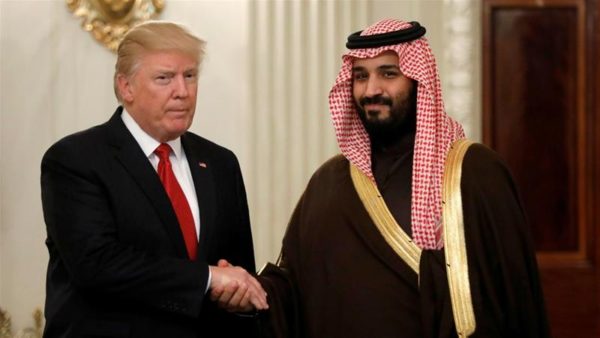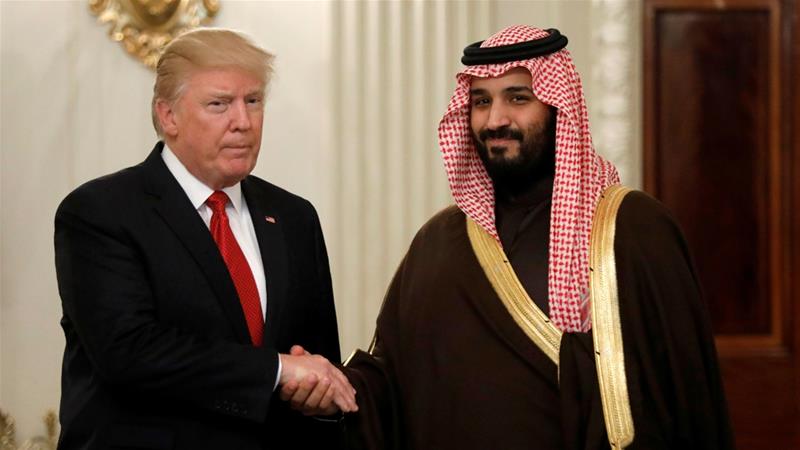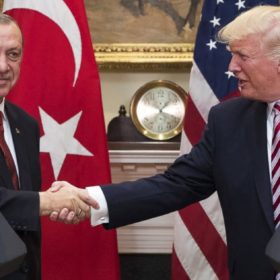
Photo Credit: Al Jazeera
“[These] are people that push gays off buildings. These are people that kill women and treat women horribly. And yet you take their money.” Donald Trump levied this charge against Hillary Clinton, whose Clinton Foundation had received money from numerous foreign sources. The argument went that Clinton, in her role as Secretary of State, conducted business with (and may have been influenced by) groups and regimes that did not share American values. The people that Trump says kills gays and women? Saudi Arabia, which, of course, Trump just returned from with a massive, 130 billion dollar arms deal in tow. America has a long history of providing arms to numerous Sunni Arab nations in the Middle East; what makes this particular deal unique is that, if approved, it would be the largest arms deal in American history. Unfortunately, the same regime that Trump condemned during the campaign is still in power, and this arms deal is yet another example of hypocrisy and inconsistent messaging from this administration.
Many Americans question why we supply arms to Saudi Arabia, an issue that arose during the recent presidential campaign. The ideas at stake are national security vs. values; those who favor arms deals like this one argue that doing so is in America’s best strategic interest. On the other hand, critics say that the Saudi government does not share our values, and that providing the regime with material and financial support actually weakens our security. Today, those who consider Saudi Arabia a valuable ally do so because of the nation’s enmity towards Iran; the reasons for this rivalry are numerous, but it boils down to the Sunni/Shia conflict in Islam. [1] While the United States has practically no stake in the religious aspects of that rivalry, the US has long considered Iran an adversary. As long as the US government perceives Iran as a threat to our national security (through its nuclear program or alleged financing of terror groups), Saudi Arabia remains a practical partner.
Critics of the US-Saudi partnership attack the relationship on several grounds:
- Saudi Arabia is the chief exporter of Wahhabism, a branch of Sunni Islam which promotes violent jihad and fundamentalist attitudes which conflict with mainstream American ideals.
- Saudi Arabia currently wages war against its neighbor Yemen, the poorest country in the region, based on unproven claims that Iran is financing the Shia minority that seized power in Yemen six years ago. The conflict has resulted in over 10,000 civilian deaths and impending famine. [2]
- Fifteen of the nineteen 9/11 hijackers were Saudi citizens, and the 9/11 Commission discovered evidence that some may have been in contact with Saudi intelligence. [1]
While the Trump administration claimed this deal as a much-needed win, the reality is more complex. The deal itself includes several smaller deals, some of which originated during the Obama administration. [3] Furthermore, some of the specific provisions of the deal must meet Congressional approval, and many members of Congress of both parties have voiced their opposition to the deal already. Current U.S. law mandates that Israel must maintain “qualitative military edge” over its neighbors when it comes to US arms deals. Essentially, this means that whatever weapons we provide to Israel’s neighbors (many of whom have had military conflicts with Israel in the past) must not provide them an edge over Israel. Some of the specific weapons, vehicles and equipment included in this deal may erode that edge, and Congress must determine if that is the case. [4] Finally, the provisions of the deal will be carried out over years; while defense contractor Lockheed Martin boasted of the creation of 18,000 American jobs as a result of this deal, those jobs will be realized at an average of 1,800 a year over a decade. And while $100bn may seem like a significant return that can be used to benefit the average American, most of that money will go directly to the defense firms, like Lockheed and Boeing, that are providing the arms.
Arms deals like this and countless others of previous administrations are not the only option available to policymakers. While Democratic and Republican administrations alike justify these deals in terms of defending the United States and combating Iran’s influence in the Middle East, there is little evidence that this is actually the case. What we do know is that the Saudi government actively promotes the spread of Wahhabism in the larger Sunni world while maintaining one of the world’s worst records on human rights. We also know that the Saudis are destroying Yemen, often using American arms and equipment in the process. One of the few restrictions the Obama administration placed on its arms deals with Saudi Arabia involved guided munitions, out of fear that they would be used against Yemeni civilians. The Trump administration has removed that restriction and is increasing the scale of arms provided.
What the American people need instead is a comprehensive approach to the Middle East and our national security interests that does not involve arming unsavory regimes but focuses on combating ISIS and supporting democratic partners in the region. While this approach would be a stark departure from decades of supporting brutal and oppressive regimes against a greater enemy, the old approach has done little to actually protect Americans at home and abroad. [5] Most of Trump’s proposed deal will take place, but Congress has the ability to restrict some aspects of it. If you think that America should not be providing bombs that will be used on Yemeni civilians, or tanks and helicopters that could be used to quell dissent in Saudi Arabia, call your representatives in Congress and urge them to fight this deal and future ones.
REFERENCES AND FOOTNOTES:
[1] Dobbs, A. (2017, May 28). The West’s War on Terror Depends on the Wrong Allies. Retrieved from https://warisboring.com/the-wests-war-on-terror-depends-on-the-wrong-allies/
[2] Costello, N. (2017, May 23). Despair, Broken Bodies — The Real Cost of Trump’s Saudi Arms Deal. Retrieved from https://warisboring.com/despair-broken-bodies-the-real-cost-of-trumps-saudi-arms-deal/
[3] Hartung, W. D. (2017, May 22). There’s Less than Meets the Eye in Trump’s Saudi Arms Deal. Retrieved from http://www.defenseone.com/ideas/2017/05/theres-less-meets-eye-trumps-saudi-arms-deal/138055/
[4] Des Roches, D. (2017, May 24). The Art of a Lethal Deal: Trump’s Offer to Saudi Arabia. Retrieved from https://warontherocks.com/2017/05/the-art-of-a-lethal-deal-trumps-offer-to-saudi-arabia/
[5] Thrall, A. T. (2017, May 25). The Saudi Deal Shows Just How Broken the US Arms Export Process Has Become. Retrieved from http://www.defenseone.com/ideas/2017/05/saudi-deal-shows-just-how-broken-us-arms-export-process-has-become/138181/




